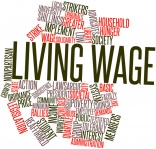Home › magazine › latest news › Paying living wages can positively affect all aspects of business activity says new report
Paying living wages can positively affect all aspects of business activity says new report
30th of May 2022A new report indicates living wages not only offer a way out of in-work poverty and help tackle inequality, they also support business resilience, stability and growth.
'The case for living wages: how paying living wages can improve business performance and tackle poverty and inequality' is jointly authored by the University of Cambridge Institute for Sustainability Leadership (CISL), Business Fights Poverty and Shift.
As a route out of working poverty and a prerequisite to tackling growing income inequalities, living wages have growing support among business, civil society, and governments says the report. Business benefits include:
• More motivated and productive workforce, with lower staff turnover
• Improved revenues and profits, for example, PayPal attributes much of its recent growth to the decision to pay ‘decent wages' to all employees
• Increased value chain resilience and performance
• Reputational benefits
• Improved investor prospects
• Readiness for future regulatory reporting.Anna Barford, senior research associate at CISL said: "Living wages are long overdue. Is it absolutely urgent and necessary for employers to switch from poverty wages to living wages. The most important benefit is people earning enough for themselves and their families to afford a decent standard of living. Living wages also offer considerable business benefits, within core operations, value chains and the wider operating environment. Conversely, not paying living wages comes with many costs.
"Living wages are a very good step towards being a good employer, but it doesn't stop there. Firstly, living wages are a wage floor, not a ceiling. Secondly, living wages should be couched within decent work - this includes legal and social protection, health and safety measures, respect, worker representation, and much more.
"Lastly, we must continue to critically assess the roll out of living wages, and course correct as required. For example, being cautious about the gendered impacts of calculations that assume people work full-time in paid roles."
Globally, 266 million wage earners receive below the minimum wage. The global population of workers living in households below the poverty line reached 630 million in 2019.Zahid Torres-Rahman, co-founder and ceo at Business Fights Poverty said: "At Business Fights Poverty, we believe in the power of business to help improve the lives, livelihoods and learning opportunities of the most vulnerable people and communities. Right now, we are at the beginning of a devastating wave of poverty, exacerbated by the effects of Covid-19, climate change and conflict. Businesses must step up, and fast, if we are to see a world with zero poverty in our lifetimes.
"This report highlights the need to reshape the narrative on living wages. Paying a living wage is an opportunity for companies to have positive social impact at scale, in a way that benefits their business as well as their employees, people in their supply chains, and the communities in which they operate. Living wages are a clear and measurable indicator of companies putting values and social purpose at the heart of their business practice."
Shift's president and co-founder Caroline Rees added: "This report moves us past near-sighted assumptions that paying living wages is simply a cost for business and therefore to be avoided. It sets out the striking evidence that companies stand to benefit when they make sure that people in their workforce and supply chain are paid a living wage, and where they invest in moving towards that critical threshold wherever wages fall short.
"The case for doing so will only strengthen as we see ever more investors scrutinising this key measure of whether a company is protecting the human capital it needs to succeed. There is now widespread recognition that living wages are key to addressing today's growing inequalities, which threaten the social cohesion and stability on which our societies - and the business within them - all depend."










